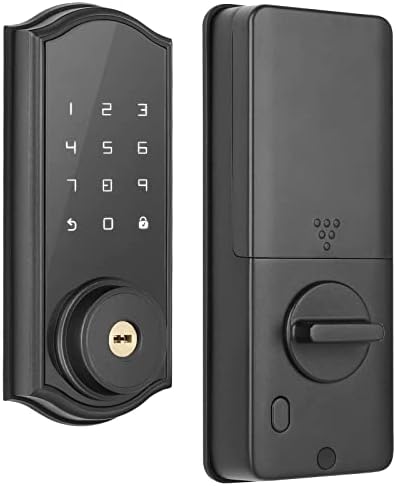Imagine coming home one day, only to find that your smart lock, which has faithfully secured your door for the past five years, is suddenly malfunctioning. As a homeowner relying on the convenience and security of a smart lock, you may wonder about the lifespan of these devices. Are you getting the most out of your investment, or is it time to consider a replacement? Understanding the longevity of smart locks is crucial in ensuring your home remains safe and accessible. Read Digital Door Lock in Hyderabad, Gurgaon & Delhi
Factors Affecting Smart Lock Lifespan
To understand the longevity of smart locks, it’s crucial to consider several key factors that significantly impact their lifespan.
- Environmental conditions play a pivotal role in the durability of smart locks. Extreme temperatures, humidity, or exposure to direct sunlight can affect the internal components, leading to malfunctions over time. Additionally, advancements in technology can influence the lifespan of smart locks. As newer models with enhanced features and security protocols are introduced, older versions may become obsolete quicker, reducing their longevity.
- User maintenance is another critical factor affecting smart lock lifespan. Regularly cleaning the lock, changing batteries as needed, and ensuring proper installation can prolong its functionality. Neglecting maintenance tasks can result in premature wear and tear, shortening the lock’s lifespan.
- Compatibility issues also impact how long a smart lock will last. Incompatibility with certain door types or smart home systems can lead to operational issues, reducing the overall lifespan of the lock. Stay informed about updates and ensure compatibility to maximize the longevity of your smart lock.

Average Lifespan of Smart Locks
- Considering the factors affecting smart lock lifespan, understanding the average longevity of these devices is crucial for making informed decisions about their maintenance and replacement. The average lifespan of smart locks typically ranges from 5 to 10 years. This timeframe can vary based on several factors such as the quality of the lock, frequency of use, environmental conditions, and maintenance practices.
- Technology advancements play a significant role in determining the lifespan of smart locks. As technology evolves, older smart lock models may become outdated quicker, leading to potential issues with compatibility and security updates. Investing in newer smart lock models with up-to-date technology can help extend their lifespan and ensure better performance over time.
- Security concerns also impact the average lifespan of smart locks. With cybersecurity threats constantly evolving, older smart locks may become more vulnerable to hacking attempts. Upgrading to newer models with enhanced security features can help mitigate these risks and prolong the lifespan of the smart lock.
Signs Your Smart Lock Needs Replacement
- If you notice your smart lock experiencing frequent malfunctions or unresponsiveness to commands, it may be time to consider a replacement. Two common signs that your smart lock needs attention are related to its power source and software functionality.
- Firstly, if your smart lock starts to exhibit irregular behavior, such as not locking or unlocking properly, it could be a sign that the batteries are running low. In such cases, try replacing the batteries with fresh ones to see if the issues persist. If the problems continue even after a battery replacement, it might indicate a more serious internal fault that requires professional attention.
- Secondly, outdated software can also cause glitches in your smart lock’s performance. Manufacturers often release software updates to improve security and fix bugs. If you start experiencing connectivity issues or other software-related problems, check if there are any available updates for your smart lock. Updating the software may resolve the issues and prolong the lifespan of your device.
Tips to Extend Smart Lock Lifespan
Taking proactive steps to maintain your smart lock can significantly increase its longevity and functionality. Regular smart lock maintenance is crucial for ensuring optimal performance and security features. Here are some tips to help extend the lifespan of your smart lock:
- Firmware Updates: Keep your smart lock’s firmware up to date. Manufacturers often release updates to improve security and fix bugs that could affect the lock’s performance.
- Battery Replacement: Replace the batteries in your smart lock according to the manufacturer’s recommendations. Low batteries can cause malfunctions and compromise security features.
- Clean Regularly: Dust and debris can accumulate in the lock mechanism over time, affecting its operation. Use a soft, dry cloth to clean the lock and remove any buildup.
- Avoid Physical Damage: Be gentle when operating the smart lock. Avoid slamming doors or using excessive force, as this can damage the internal components.
Upgrading Your Smart Lock
- To ensure your smart lock continues to operate efficiently and securely, upgrading to the latest model with enhanced features and improved technology is a prudent step. When considering upgrading your smart lock, compatibility concerns should be a top priority. Newer models often come with advanced connectivity options like Bluetooth, Wi-Fi, or Z-Wave, which may not be compatible with older systems or your current smart home setup. Ensuring that your new smart lock integrates seamlessly with your existing devices is crucial to avoid any potential issues.
- Moreover, upgrading your smart lock can help mitigate security risks. Older models may lack the latest encryption standards or security protocols, leaving them vulnerable to hacking or unauthorized access. By upgrading to a newer model, you can benefit from improved security features such as two-factor authentication, tamper detection, and secure communication channels, enhancing the overall protection of your home.
Conclusion
In conclusion, the lifespan of a smart lock can vary depending on factors such as usage, maintenance, and quality of the product. On average, smart locks can last anywhere from 5 to 10 years. It’s important to be aware of signs that indicate your smart lock may need replacement, and to follow tips to extend its lifespan. Upgrading to a newer model can also ensure the security and efficiency of your home.

